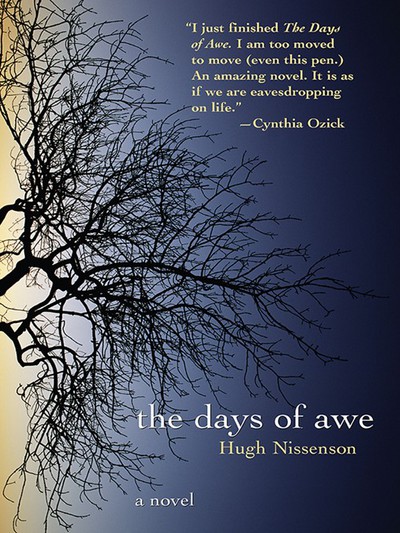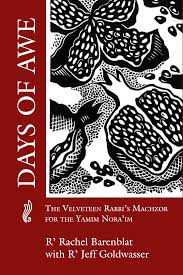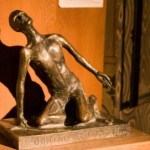 The Ten Days of Awe, the High Holy Days of Judaism, began last week with the two-day Jewish New Year, Rosh Hashonah, days of rejoicing and remembrance of ancient sacrifices and averted calamities.
The Ten Days of Awe, the High Holy Days of Judaism, began last week with the two-day Jewish New Year, Rosh Hashonah, days of rejoicing and remembrance of ancient sacrifices and averted calamities.
Poet David Lehman writes:
For I started the (first) day by eating an apple dipped in honey, as ritual required.
. . .For I asked Our Father, Our King, to save us for his sake if not for ours,
for the sake of his abundant mercies, for the sake of his right hand, for the sake of those who went through fire and water for . . . his name.
When the people of God followed Moses out of Egypt, into the wilderness, they began with a dream of a land of milk and honey, toward which their wandering would lead them. Calamities and sacrifices marked their way. And abundant mercies.
 Exhilaration was stronger than fear for quite a time. And when their fear of hunger grew strong, there was manna. And when their thirst grew terrifying, there came water, sprung from a rock. But the further they went, the harder trust became. And then they begged for law. As a sign, they said, for the presence of mercy did not allay their fear of evil.
Exhilaration was stronger than fear for quite a time. And when their fear of hunger grew strong, there was manna. And when their thirst grew terrifying, there came water, sprung from a rock. But the further they went, the harder trust became. And then they begged for law. As a sign, they said, for the presence of mercy did not allay their fear of evil.
The Ten Commandments came into a moment when much that was evil in the sight of the Lord was rampant among them. And ever since, the journey of the High Holy Days has led to the Day of Atonement, when the Law given to Moses convicts and restores them, each and all.
It is worth saying about the Law, that all Ten Commandments were being broken by the people when Moses came down the mountain carrying the tablets. Moses burned with rage. And then delivered the sobering news.
 It is worth saying that all the Commandments are always being broken in this world, and that each of us, in our own lives, manages to break them all one way or another.
It is worth saying that all the Commandments are always being broken in this world, and that each of us, in our own lives, manages to break them all one way or another.
It is worth saying that the Law was meant to be written in our hearts, and not on the walls of our courtrooms or classrooms, or even our churches, for their role is to provoke confession, not to justify the administration of punishment by others. For God is still and forever a God of mercy, as the people of God know. And a prayer for mercy is the right response to the Law.
And it is worth noting that the desires which the Law forbids are idolatry and swearing, lying, stealing, murder, false witness, dishonoring parents, coveting what others have, failing to keep a day of rest, and adultery.
These, the holiest laws of all for the people of God, do not include sex before marriage as a sin, nor divorce, birth control, abortion or homosexuality. Yet Christians have become known as people who place these sexual ‘virtues’ ahead of all other things.
 And we pay so little attention to our idolatries, the merciless things we worship and fervently hope will save us, the flag, the gun, the dollar. Nor do we often name our covetousness at the heart of capitalism; the fact that so many have to work two and three jobs in order to survive and have no decent place to rest; the murders of young black men we excuse because older, armed white men say they were afraid; the false witnessing that fills our political campaigns with appeals to fear and suspicion.
And we pay so little attention to our idolatries, the merciless things we worship and fervently hope will save us, the flag, the gun, the dollar. Nor do we often name our covetousness at the heart of capitalism; the fact that so many have to work two and three jobs in order to survive and have no decent place to rest; the murders of young black men we excuse because older, armed white men say they were afraid; the false witnessing that fills our political campaigns with appeals to fear and suspicion.
We think we know what virtuous life is, and who decent people are. If only more power were ours, we could surely arrive at the sweet land of our dreams, where sorrow and sighing would flee away.
 Jesus, in his story of the landowner and the vineyard, confounds our wisdom while upholding the Law of Moses. The landowner planted a vineyard, put a fence around it, dug a winepress into it, built a watchtower, and went away, leaving tenants to do the work. The tenants kill all who are sent to collect the fruits of the land, which are the rent. One after another, even the son of the landowner, is killed. What will the landowner do? asks Jesus. And his outraged listeners say, He will kill those tenants and find others who will give him the harvest. But Jesus says, Have you never heard that the stone that the builders rejected will become the cornerstone? The kingdom of heaven will be given to those who produce the fruits of the kingdom.
Jesus, in his story of the landowner and the vineyard, confounds our wisdom while upholding the Law of Moses. The landowner planted a vineyard, put a fence around it, dug a winepress into it, built a watchtower, and went away, leaving tenants to do the work. The tenants kill all who are sent to collect the fruits of the land, which are the rent. One after another, even the son of the landowner, is killed. What will the landowner do? asks Jesus. And his outraged listeners say, He will kill those tenants and find others who will give him the harvest. But Jesus says, Have you never heard that the stone that the builders rejected will become the cornerstone? The kingdom of heaven will be given to those who produce the fruits of the kingdom.
This is hopeful news for tenants, and undocumented workers, for migrants picking our food, for refugees from war. And this is not such good news for people living on investments and absentee landlords, for in the economy of Jesus, those who labor hard to produce its fruits are the people to whom the kingdom belongs. Truly, this tale, and the time it points to, are Days of Awe.
 The last word is aptly spoken by Archbishop Oscar Romero of El Salvador, who was shot at the altar by those who considered him a rebellious tenant of the land: It is very easy to be servants of the word without disturbing the world: a very spiritualized word, a word without any commitment to history, a word that can sound in any part of the world because it belongs to no part of the world. A word like that creates no problems, starts no conflicts. What starts conflicts and persecutions, what marks the genuine Church, is the word that, burning like the word of the prophets, proclaims and accuses; proclaims to the people God’s wonders to be believed and venerated, and accuses of sin those who oppose God’s reign . . .
The last word is aptly spoken by Archbishop Oscar Romero of El Salvador, who was shot at the altar by those who considered him a rebellious tenant of the land: It is very easy to be servants of the word without disturbing the world: a very spiritualized word, a word without any commitment to history, a word that can sound in any part of the world because it belongs to no part of the world. A word like that creates no problems, starts no conflicts. What starts conflicts and persecutions, what marks the genuine Church, is the word that, burning like the word of the prophets, proclaims and accuses; proclaims to the people God’s wonders to be believed and venerated, and accuses of sin those who oppose God’s reign . . .
______________________________________________
Illustrations:
1. The Days of Awe, book cover image. Google Images.
2. Poster for Days of Awe. Google Images.
3. Book Cover, Stories for Rosh Hoshanah and Yom Kippur. Google Images.
4. Idolatry. photo of money, Google Images.
5. Days of Awe. Book cover image, author: Velveteenrabbi.com. Google Image.
6. Archibishop Oscar Romero. Pastel by J. Puig Reixach, from Wikipedia page for Romero.











